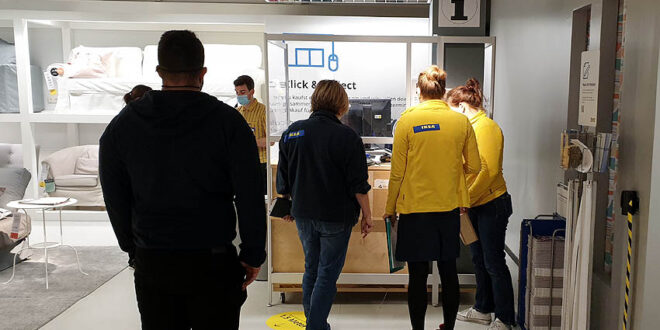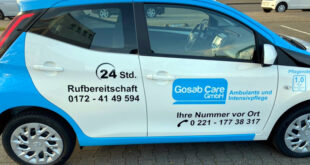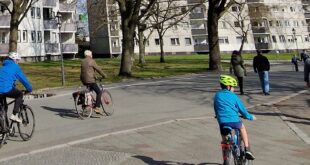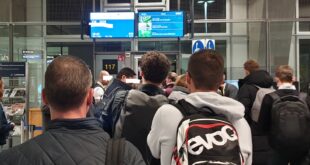Chancellor Angela Merkel and the Premiers of the 16 federal states decided on Wednesday (3 March) to extend the shutdown until 28 March. In the same breadth, a plan for the easing of the restrictions was announced.
“The daily reporting figures show that the efforts of the last few months have paid off and lower incidences have been achieved. This has noticeably relieved the burden on the health system and led to falling death rates,” the press statement issued after the video meeting on Wednesday said.
The federal and state governments also announced that, if the infection is stable in the next few weeks and months, there will be a four-pronged approach – of vaccination, testing, contact tracing and openings.
Here are highlights of the resolution of the chancellor and the state premiers, relaxing COVID-19 restrictions, including the reopening of businesses, and which are expected to gradually restore normal life in the country:
Relaxation of private gathering restrictions
From 8 March, the severely restricted private contact restrictions are to be relaxed nationwide as follows:
- Private gatherings of one’s own household with another household are now possible, but limited to a maximum of five persons. Children up to 14 years of age are not counted. Couples are considered as one household.
- In regions with a 7-day incidence of less than 35 new infections per week, the possibilities for private gatherings can be extended to one’s own household and two other households with a maximum of ten persons together. Children up to 14 years of age are excluded.
If the 7-day incidence per 100,000 inhabitants rises to above 100 on three consecutive days in a federal state or region, the lockdown rules that applied until 7 March will come into force again (the ’emergency brake’ rule). The possibility of private gatherings will again be limited to one’s own household and one other person. Children up to 14 years of age are not counted.
Reopening of public life
The Decision (Beschluss) of the federal-state governments’ meeting provides for a 5-phase plan to guide the process of returning to normal life. Each phase will commence every 14 days if regional infection numbers are stable or decreasing. The ’emergency brake’ provision will return regions to current lockdown rules if there are three consecutive days with an incidence rate above 100 per 100,000 people per week.
Phase 1:
Phase 1 began with the reopening of schools, daycare centres, hairdressing and beauty salons as well as barber shops on 1 March.
Phase 2:
- Personal contact services, such as massage parlours, as well as driving and flying schools can reopen with appropriate hygiene concepts; for example, the staff and customers must present a negative coronavirus test result.
- Bookshops, flower shops and garden markets will henceforth be classified uniformly in all federal states as part of the retail trade for daily needs.
Phase 3:
Starting from 8 March at the earliest, individual federal states can decide on further opening of public life depending on the local incidence rate of infection as follows:
a. If a stable 7-day incidence of less than 50 new infections per 100,000 inhabitants is achieved in a state or region, they may allow:
- the opening of retail trade with a limit of one customer per 10 square meters for the first 800 square meters of retail space and one for each additional 20 square meters;
- the opening of museums, galleries, zoological and botanical gardens and memorials;
- non-contact sports in small groups (max. 10 persons) in outdoor areas, including outdoor sports facilities.
b. If the incidence rate is between 50 to 100, the states may allow the following:
- the opening of the retail trade for the so-called appointment shopping
(“click and meet”), whereby a customer can book an appointment in the store for a fixed period of time - the opening of museums, galleries, zoological and botanical gardens
and public memorials to visitors with prior booking of appointments - non-contact sports with a maximum of 5 persons from 2 households and sports in groups of up to twenty children up to 14 years of age in outdoor areas
Phase 4:
– The commencement of this phase starting on 22 March at the earliest depends on the condition that the 7-day incidence has not worsened for 14 days and remains stable at below 50 new infections after the entry into effect of the third opening phase nationwide or regionally. States may allow:
- the opening of outdoor restaurants;
- the opening of theatres, concert halls, opera houses and cinemas;
- non-contact sports indoors, contact sports outdoors.
Phase 5:
The phase starting on 5 April at the earliest is also conditional on the 7-day incidence having not worsened for 14 days after the fourth opening phase in the state or region
a. If the 7-day incidence remains stable at less than 50 new infections per 100,000 inhabitants, the state may allow:
- Outdoor recreational events with up to 50 participants;
- indoor contact sports
b. If the infection rate is between 50 to 100, the state may allow:
- the opening of retail shops with a limit of one customer per 10 square meters for the first 800 square meters of retail space and one for each additional 20 square meters;
- indoor non-contact sports, outdoor contact sports (no testing requirement).
————
Home Office
Government said it’s still necessary to reduce personal contacts to the absolute minimum at the workplace and on the way to work. Therefore, the corresponding ordinance demanding that employers allow employees to work from home if their work allows it will be extended until 30 April 2021.
Free testing
Government believes that testing for infection is an important instrument to deal with the pandemic and to guide the return to normal life. At least one free rapid test per week will be available to all residents of Germany starting on 8 March.
“The availability of rapid and self-tests in large quantities represents another building block that will make it possible to positively influence pandemic trend in the coming months,” the federal-states’s statement said.
“The more citizens consistently participate in the test programme, the greater the effect.”
Unnecessary contacts and travels
In a plea to the populace to remain vigilant, government said that the principle of avoiding contacts remains the essential tool in the fight against the pandemic, saving countless lives and preventing severe disease progression every day.
Government also appeals to all citizens to refrain from non-essential travel within the country and also abroad. The statement of the chancellor-premiers’ meeting emphatically point out that entry into the country from foreign risk areas is obligatory and that quarantine is compulsory for a period of 10 days after return.
The Chancellor and the 16 state premiers will meet again on 22 March to discuss further opening steps.
Sola Jolaoso & Felix Dappah
 THE AFRICAN COURIER. Reporting Africa and its Diaspora! The African Courier is an international magazine published in Germany to report on Africa and the Diaspora African experience. The first issue of the bimonthly magazine appeared on the newsstands on 15 February 1998. The African Courier is a communication forum for European-African political, economic and cultural exchanges, and a voice for Africa in Europe.
THE AFRICAN COURIER. Reporting Africa and its Diaspora! The African Courier is an international magazine published in Germany to report on Africa and the Diaspora African experience. The first issue of the bimonthly magazine appeared on the newsstands on 15 February 1998. The African Courier is a communication forum for European-African political, economic and cultural exchanges, and a voice for Africa in Europe.



































